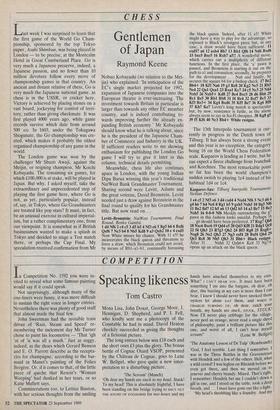CHESS
Gentlemen of Japan
Raymond Keene
Last week I was surprised to learn that the first game of the World Go Cham- pionship, sponsored by the top Tokyo paper, Asahi Shimbun, was being played in London — to be precise, at the Montcalm Hotel in Great Cumberland Place. Go is very much a Japanese preserve, indeed, a. Japanese passion, and no fewer than 10 million devotees follow every move of championship games in that country. An ancient and distant relative of chess, Go is very much the Japanese national game, as chess is in the USSR, or cricket here. Victory is achieved by placing stones on a vast board, jockeying for control of terri- tory, rather than giving checkmate. It was first played 4000 years ago, while game records survive which date from around 500 AD. In 1603, under the Tokugawa Shogunate, the Go championship was cre- ated, which makes it probably the oldest organised championship of any game in the world.
The London game was won by the challenger Mr Shuzo Awaji, against the Meijin, or reigning champion, Mr Koichi Kobayashi. The remaining six games, for which £100,000 is at stake, will be played in Japan. But why, I asked myself, take the extraordinary and unprecedented step of playing the first game here, where Go is not, as yet, particularly popular, instead of, say, in Tokyo, where Go Grandmasters are treated like pop stars? It must, in fact, be an unusual exercise in cultural imperial- ism, but a rather complimentary one, from our viewpoint. It is somewhat as if British businessmen wanted to make a splash in Tokyo and decided to stage a Test match there, or perhaps the Cup Final. My speculation received confirmation from Mr Nobuo Kobayashi (no relation to the Mei- jin) who explained: 'In anticipation of the EC's single market projected for 1992, expansion of Japanese companies into the European theatre is ever-increasing. The investment towards Britain in particular is larger than towards any other EC member country, and is indeed contributing to- wards improving further the already ex- panding British economy.' Mr Kobayashi should know what he is talking about, since he is the president of the Japanese Cham- ber of Commerce and Industry in the UK. If sufficient readers write to me showing enthusiasm for publishing the London Go game I will try to give it later in this column, technical details permitting. Meanwhile, chess life also continues, apace in London, with the young Indian Dipu Barua winning this year's traditional NatWest Bank Grandmaster Tournament. Sharing second were Levitt, Adams and the great veteran, David Bronstein. Levitt needed just a draw against Bronstein in the final round to qualify for his Grandmaster title. But now read on,..
Levitt-Bronstein: NatWest Tournament, Final Round; Benko Gambit.
1 d4 Nf6 2 c4 c5 3 d5 b5 4 ND e6 5 Bg5 h6 6 Bxf6 Qx16 7 Nc3 b4 8 Nb5 Kd8 9 a3 Qxb2 10 e 4 exd5 Now White misses his chance. With 11 e5! he incarcerates the black queen and threatens to force a draw, which Bronstein could not avoid, by means of Rbl-al-bl, continually harassing the black queen. Indeed, after 11 e5! White might have a way to play for the advantage, so exposed is Black's strongest piece but, in any case, a draw would have been sufficient. 11 exd5? a6 12 axb4 Bb7 13 Rbl Qf6 14 Nd6 Bxd6 15 bxe5 Bxc5 16 Rxb7 85!! A wonderful move, which carries out a multiplicity of different functions. In the first place, the `a' pawn is passed, and Bronstein is starting it out on the path to al and coronation; secondly, he prepares for the development Na6 and finally, he secures the square EA for a bishop check. 17 Be2 Bb4+ 18 Kfl Na6 19 g3 Re8 20 Kg2 Ne5 21 Rb5 Ne4 22 Qa1 Qxal 23 Rxal Kc7 24 c5 Nc3 25 Nd4 Nxb5 26 Nxb5+ Kd8 27 Bc4 Bxc5 28 d6 Bb6 29 Rd Re5 30 Rb1 Rb8 31 f4 Re4 32 Bx17 Bc5 33 K13 Re3+ 34 Kg4 Bxd6 35 Kf5 Be7 36 Kg6 Bf8 37 Kh7 Ke7 Levitt's king march is spectacular but, by now, resistance is futile, as the aliens always seem to say in Sci-Fi cheapies. 38 Kg8 g5 39 f5 Kf6 40 Nc3 Bb4+ White resigns.
The 13th Interpolis tournament is cur- rently in progress in the Dutch town of Tilburg. It has always been a strong event and this year is no exception, the category being 16 on the World Chess Federation scale. Kasparov is leading as I write, but he can expect a fierce challenge from Ivanchuk and Korchnoi. The most remarkable point so far has been the world champion's sudden switch to playing 1e4 instead of his habitual 1d4 or 1c4.
Kasparov-Sax: Tilburg Interpolis Tournament; Sicilian Defence.
1 e4 c5 2 ND e6 3 d4 csd4 4 Nxd4 Nf6 5 Nc3 d6 6 g4 h6 7 h4 Nc6 8 Rgl 115 9 gxh5 Nx115 10 Bg5 Nf6 11 8e2 Bd7 12 h5 a6 13 Qd2 b5 14 a3 Be7 15 Be3 Nxh5 16 0-0-0 Nf6 Meekly surrendering the g7 pawn in this fashion looks suicidal. Perhaps 16
g6 should have been preferred. 17 Rxg7 Qb8 18 Nxe6 Bxe6 19 Qd4 e5 20 Qd311,13 21 Rdgl Qc8 22 f4 Qh3 23 R7g3 Qh2 24 Bf3 Rg8 25 Rxg8+ Nxg8 26 Ne2 Qh3 27 Ng3 exf4 28 Bxf4 Qh4 29 Qe3 Rc8 30 Nh5 Qh3 31 Bh6+ Black resigns. After31 ... Nxh6 32 Qxh6+ Ke8 33 Ng7+ opens up an attack on the black queen.


























































 Previous page
Previous page